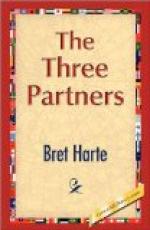Steptoe stared at this flesh of his own flesh half in relief, half in frightened admiration. Sitting astride the log, his elbows on his knees and his gloved hands supporting his round cheeks, the boy’s handsome face became illuminated with an impish devilry which the father had never seen before. With dancing eyes he went on. “It was one of those very games we played so long ago that he wanted to see me about and wanted me to keep mum about, for some of the folks that he played it on were around here now. It was a game we got off on one of the big strike partners long before the strike. I’ll tell you, dad, for you know what happened afterwards, and you’ll be glad. Well, that partner—Demorest—was a kind of silly, you remember—a sort of Miss Nancyish fellow—always gloomy and lovesick after his girl in the States. Well, we’d written lots of letters to girls from their chaps before, and got lots of fun out of it; but we had even a better show for a game here, for it happened that Van Loo knew all about the girl—things that even the man’s own partners didn’t, for Van Loo’s mother was a sort of a friend of the girl’s family, and traveled about with her, and knew that the girl was spoony over this Demorest, and that they corresponded. So, knowing that Van Loo was employed at Heavy Tree, she wrote to him to find out all about Demorest and how to stop their foolish nonsense, for the girl’s parents didn’t want her to marry a broken-down miner like him. So we thought we’d do it our own way, and write a letter to her as if it was from him, don’t you see? I wanted to make him call her awful names, and say that he hated her, that he was a murderer and a horse-thief, and that he had killed a policeman, and that he was thinking of becoming a Digger Injin, and having a Digger squaw for a wife, which he liked better than her. Lord! dad, you ought to have seen what stuff I made up.” The boy burst into a shrill, half-feminine laugh, and Steptoe, catching the infection, laughed loudly in his own coarse, brutal fashion.
For some moments they sat there looking in each other’s faces, shaking with sympathetic emotion, the father forgetting the purpose of his coming there, his rage over Van Loo’s visit, and even the rendezvous to which his horse in the road below was waiting to bring him; the son forgetting their retreat from Heavy Tree Hill and his shameful vagabond wanderings with that father in the years that followed. The sinking sun stared blankly in their faces; the protecting pines above them moved by a stronger gust shook a few cones upon them; an enormous crow mockingly repeated the father’s coarse laugh, and a squirrel scampered away from the strangely assorted pair as Steptoe, wiping his eyes and forehead with his pocket-handkerchief, said:—
“And did you send it?”
“Oh! Van Loo thought it too strong. Said that those sort of love-sick fools made more fuss over little things than they did over big things, and he sort of toned it down, and fixed it up himself. But it told. For there were never any more letters in the post-office in her handwriting, and there wasn’t any posted to her in his.”




